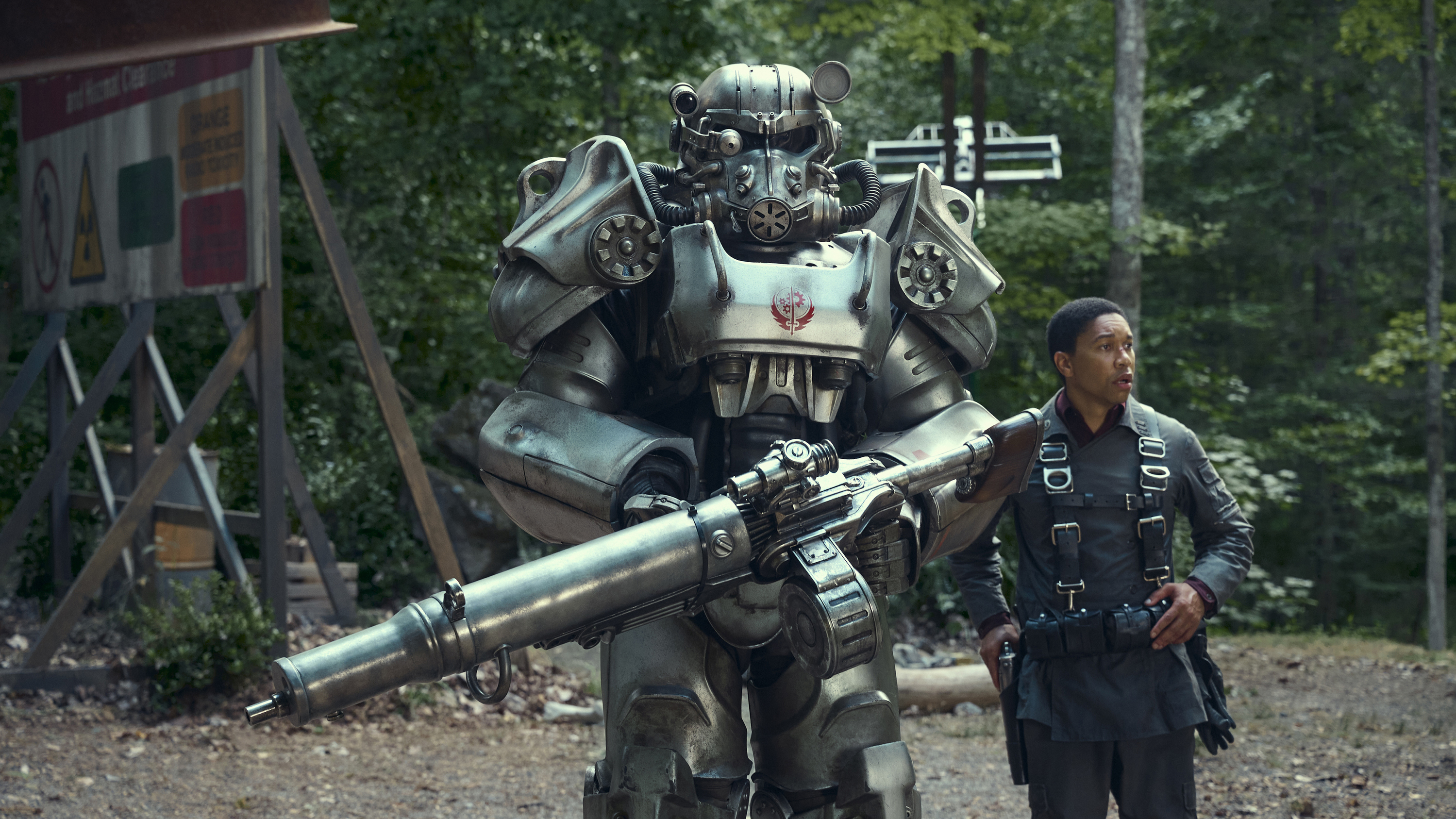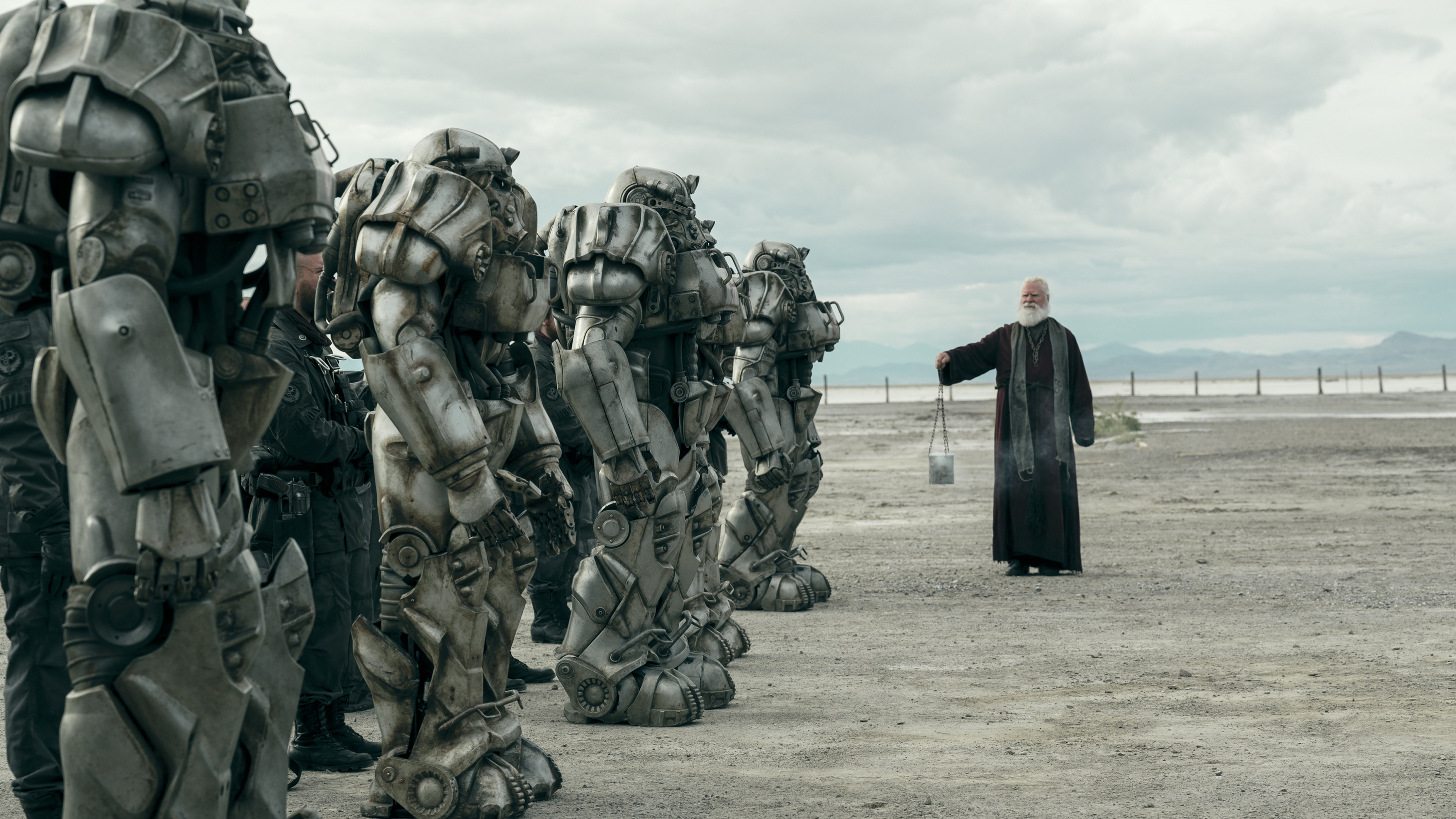
A couple added features aside, the Fallout show's power armor is remarkably faithful to the suits found in the Fallout games: big, clumsy, ridiculous. They could've wound up looking very different, though, because according to Fallout show production designer Howard Cummings, Bethesda never insisted on adherence to the games.
"They didn't say, 'You have to do the game,'" said Cummings in an interview with PC Gamer this week. "They never said that. They said, 'Show us what you think it should be.'"
Cummings didn't know much about the Fallout games when he started working on the show, but after reading the script and researching the series, he says he "just loved it" and decided, "We have to try to recreate it as best we can." Knowing the power armor would be his biggest task, it was the first thing he and prop masters Michael Jortner and Peter Gelfman started work on. That was a slight problem.
"It was so early on, Bethesda didn't know what we were doing quite yet, so they weren't sharing assets with me," said Cummings. When they later showed Todd Howard and other producers what they'd been working on, the response was, "Oh, you're doing the game," he recalled.
Working with Bethesda was the opposite of some other production experiences he's had, where the source material's owner insisted on approving each and every detail. "I started turning to them, instead of the other way around," said Cummings, because he knew fans were "going to analyze the heck out of" the show.
It's probably a good thing Bethesda wasn't breathing down his neck, because it sounds like the power armor was a hard enough project without any extra red tape. Generally, prop designers will put someone in a green or blue suit and stick pieces of sci-fi armor to them to create a reference for CG artists, says Cummings, but in this case, executive producer Jonathan Nolan "really felt it had to be a functioning suit."
The power armor was initially modeled by concept artist Thang Le, and the designs were sent to a company called Legacy Effects, which has produced many famous sets of screen armor, including Iron Man suits for the Marvel films.
At least four full power armor suits were produced, Cummings recalls, though not all of them were wearable. A "clam shell suit" was made for the scene in which Maximus climbs in and it closes around him. We're seeing a practical effect when the suit opens, but it couldn't actually be closed with a person inside—at least not without crushing them—so that bit is CG. Another suit was made not to be worn, but to be used as a "doll" that they smashed into things.

Other suits, however, could be worn by stunt performers and actors. The wearers could even puppet the hands, although only well enough to pick something up for a moment—anything that needed to be carried had to be affixed to the suit. This might explain why we only see power armor users holding guns a few times in season one.
Part of the reason Cummings wanted to produce the suits early was to give the performers time to get used to them.
"The stunt guys have to rehearse in it, and it will look like shit if they don't have time to rehearse in it," he recalls saying while seeking a signature for the (presumably quite large) check to fund the armor's fabrication. "And the stunt guy, named [Adam] Shippy, he could break dance in it."
Some of the suits we see are obviously animated, like when Maximus uses his Iron Man-like hand thrusters—a power armor feature invented for the show—during the Filly fight in episode two. But there was real stunt work there, too. For the bit where Maximus makes his entrance by descending from a wall of shipping crates, they hired actual jetpack pilot Jamie Stanley to perform the maneuver. He couldn't actually wear a full power armor suit while jetpacking, but he did wear pieces of it as reference points for animators.
Besides the thrusters, the show adds an opening faceplate to the power armor, which is used a couple times to reveal the identity of the suit's wearer. Otherwise, it's the same stupid, clunky diving-suit-thing we see in the games. Adaptations are sometimes criticized for being too literal, but I can't imagine the power armor looking any other way.







